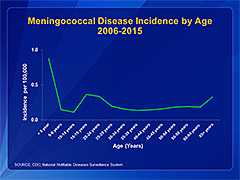Age as a Risk Factor
Infants, preteens, teens, and young adults have the highest rates of meningococcal disease in the United States.
Infants
CDC recommends meningococcal conjugate vaccines for children as young as 6 weeks old if they
- Have certain medical conditions
- Are traveling to specific countries
- Are at risk because of an outbreak in their community
Preteens, Teens, and Young Adults
CDC recommends vaccinating all 11 through 18 year olds with a meningococcal conjugate vaccine. Preteens 11 to 12 years old should visit their clinicians to receive 1 dose and other preventive services. Since protection decreases over time, CDC recommends a booster dose at age 16. This allows teens to continue having protection during the ages when they are at highest risk of meningococcal disease.
Ask your healthcare professional which meningococcal vaccines they recommend for you or your child.
Teens and young adults (16 through 23 year olds) may also be vaccinated with a serogroup B meningococcal vaccine, preferably at 16 through 18 years old. Multiple doses are needed, regardless of the brand chosen, and the same vaccine brand must be used for all doses.
Learn more about meningococcal vaccination recommendations.
Related Pages
- Meningococcal Vaccination for Preteens and Teens: Information for Parents
Get information about CDC’s meningococcal vaccine recommendations. - CDC’s Preteen Vaccine Campaign
CDC has posters, flyers, and PSAs in English and Spanish to educate parents and providers about preteen vaccines. - Meningococcal State Mandates for Colleges and Universities
Heading off to college? Read about the meningococcal mandates for the state in which your college or university resides. - Meningococcal State Mandates for Elementary and Secondary Schools
Find out the meningococcal vaccination mandates for elementary and secondary schools in your state.
- Page last reviewed: March 28, 2017
- Page last updated: March 28, 2017
- Content source:
- Content source: National Center for Immunization and Respiratory Diseases


 ShareCompartir
ShareCompartir
